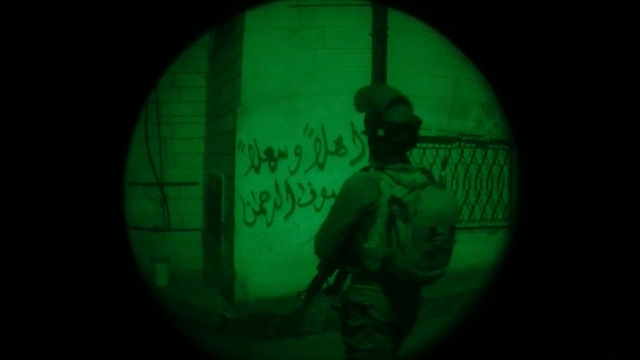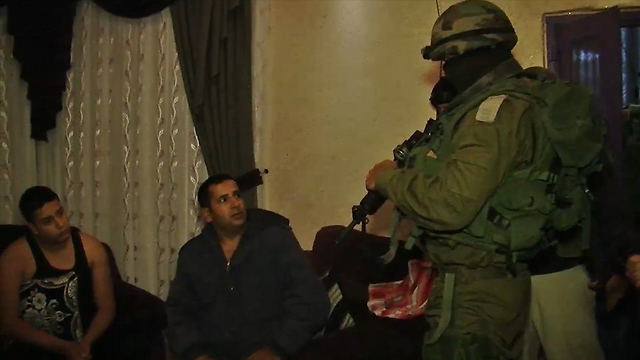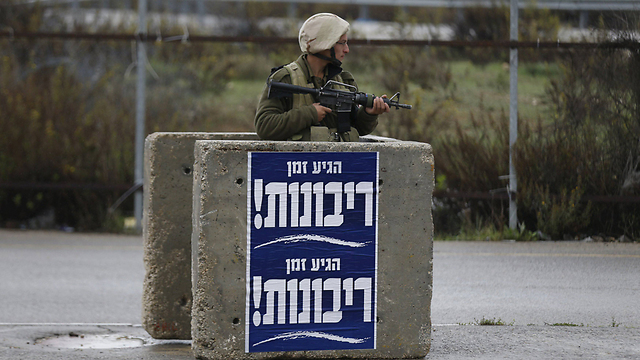Ron Ben-Yishai accompanies the IDF’s Etzion Brigade commander on a visit to Beit Ummar near Hebron, during which persuasion is used on a Palestinian family to prevent youth from deciding to attack.
Roman Gofman, the Etzion Brigade Commander, stopped his Jeep at the hitchhiker’s station at Gush Etzion junction, where so many Israelis have been stabbed and run over. He recalls Hadar Buchris who was murdered there on November 22: “I was here when it happened,” he said. “The thought that it may have been possible to prevent her murder torments me.”
The IDF is very concerned about what is happening at the junction, and there are those who are asking for complete separation between Palestinians and Jews there. But Central Command does not want to harm Palestinians’ and Israeli settlers’ fabric of life beyond what is necessary.
The great majority of those residing in Gush Etzion would like to live in in coexistence with Palestinians and they, with the support of the government, intend to stay in their communities in any settlement of the conflict – whether it be negotiated or unilateral.

A complete separation between them and their neighbors is therefore an admission of failure and would deal a severe blow to the morale and sense of security of the Jewish residents of Gush Etzion. On the other hand, the stabbings and vehicular attacks continue. The IDF has therefore decided as a last resort to station an elite special forces unit with extraordinary capabilities at the junction: Maglan. They are working in order to try to identify the attackers before they reach the vicinity of their potential victims.
Col. Gofman claims that “it is possible to locate the lone terrorist before he has taken the final decision to stab or run over someone and stop it. This requires two things: locating the potential attacker and then putting pressure on him or persuading him not to carry out the attack. Once he has decided to attack it’s very hard to stop him.”
This is a new, creative and almost revolutionary approach. After intense brainstorming at Central Command, they now argue that one can detect in advance a potential lone terrorist. There are enough indicators – one just has to look for them in places we haven’t arrived at yet.
An attempt at leveraging pressure
It’s a short ride from Gush Etzion junction to the Palestinian town of Beit Ummar. As we near the town it is about 3:30am and laborers who work in Israel are already drinking coffee at a neon-lit café. Another two minutes and we are at the entrance to the town which is notorious among security forces – a man who perpetrated a vehicular attack last Friday, Omar Arafat al-Zaaqiq, lived here.

A tall pillbox serves as a security station at the entrance to the town. Soldiers inspect all vehicles before they join Route 60, the main route leading out of the town. It’s the same in other villages in the area. The aim is to prevent attacks on Israeli cars that share this route with Palestinians.
Col. Gofman purposely decided to show me Beit Ummar at this unusual hour, as it is when the IDF employs its method of putting pressure on potential lone attackers to prevent them from taking the fatal decision. Gofman calls this a ‘targeted closure.’ I’ve heard of other types of closure but never this one. This was a new method in the effort to prevent terror.
This is put into effect by the Shimshon Battalion of the Kfir Brigade, whose fighters make their way to the addresses of fewer than 20 potential lone attackers identified in the village. The soldiers go from one address to another, knock on the door – if possible without shouting and drawing their guns – and go inside. Then the leveraging of pressure and convincing begins.
Most youth who throw stones and Molotov cocktails are arrested. They don’t sit in jail for a long time, but the goal is to deter them. Even during investigations an effort is made to persuade them not to commit similar attacks.

Experience shows that these talks, before a potential terrorist carries out his plan, are very influential. In the case of those who have not yet acted and who have no criminal file, the IDF talks with parents and family, explaining to them the potentially grave consequences of such actions.
I witnessed this kind of discussion at the house of the Mar’i family, who are wealthy and influential in the town. A soldier in uniform wearing a ski mask asks in fluent Arabic: “How many children do you have? What do they do?”
‘We want to see the child come home from school’
The family members, woken up at 4am, say what you would expect them to say. “All the agitators and attackers are already in jail, our children have nothing to do with them.” The women and young children are sent into another room and then comes direct conversation between men. “Be careful. We see your children. They are engaged in activities that endanger you and endanger themselves. Make sure they don’t get into trouble.”
When we leave Col. Gofman tells me: “Palestinian families, even those who distribute candy after attacks, do not want their sons to commit suicide. Most of them are like that. Most of them want to see their child come home from school, or the younger son return home from work, so they are therefore a powerful influence through whom we try to act.”
“You put pressure, threatening them with house demolitions?” I asked. Gofman was not too quick to answer. “How do you locate the potential attackers?” I asked instead.
He replied: “Every attaker leaves signs long before they decide to become martyrs. We just need to pick up these signals from every possible source: Shin Bet, social networks and many other things that would point to a young person aged 16 to 25 being a potential attacker.”
Gofman thought for a moment before adding: “In earlier periods terrorists wanted to kill Jews and some were willing to become martyrs for it. Now they want to become martyrs and if they can kill a couple of Jews while accomplishing that then all the better. One way or another they are lauded and gain status in Palestinian society. They are the target of incitement from all directions. Lone attacks are a result of a vicious cycle whose essence is imitation and inspiration.”
This analysis is likely. The question is whether the IDF will know how to interrupt this vicious cycle and restore calm, at least for a while, until the next wave of terror. Dealing with individual terrorists is currently the IDF’s main challenge in the West Bank.
As reported by Ynetnews
